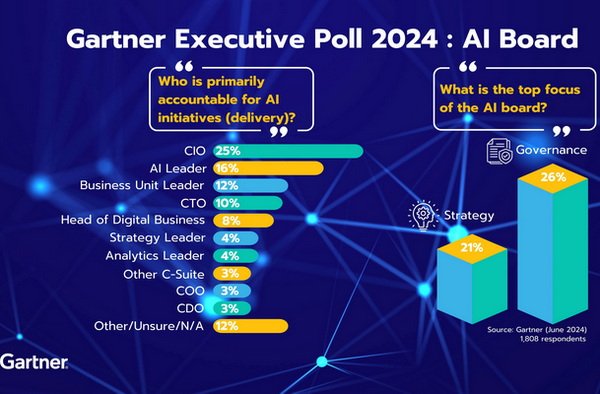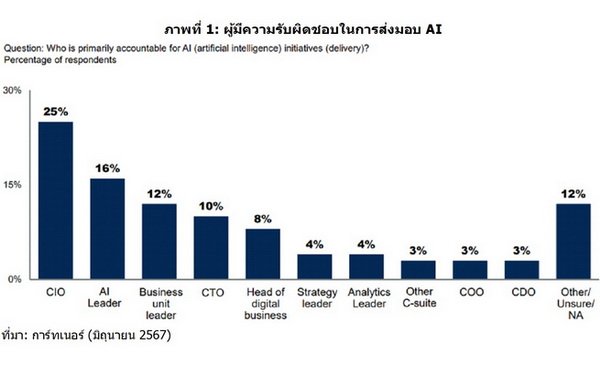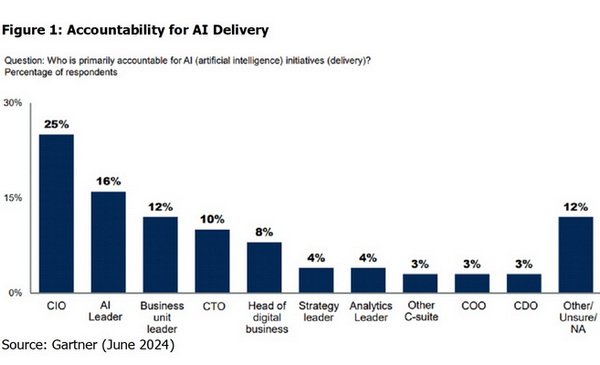การ์ทเนอร์เผยผลสำรวจล่าสุดของผู้บริหารระดับสูงกว่า 1,800 ราย พบว่า 55% ขององค์กรมีคณะกรรมการที่ดูแลด้านการใช้งาน AI หรือ AI Board และ 54% ระบุว่ามีหัวหน้าด้าน AI หรือ AI Leader ที่ประสานงานและดูแลกิจกรรมต่าง ๆ ภายในองค์กร
ฟราสซิสคารามูซิส รองประธานฝ่ายวิจัย การ์ทเนอร์ กล่าวว่า “จากผลการวิจัยพบว่าองค์กรทั่วโลกมีความเห็นต่างกันในเรื่องความจำเป็นของการมีคณะกรรมการด้าน AI หรือ AI Board ซึ่งคำตอบของประเด็นนี้คือองค์กรจำเป็นต้องมี AI Board เพื่อขับเคลื่อนกลยุทธ์ AI ให้บรรลุเป้าหมาย โดยเปรียบเสมือนคณะกรรมการกลางที่คอยกำหนดทิศทาง ดูแล และควบคุมการใช้ AI ให้เกิดประสิทธิภาพสูงสุด พร้อมลดความเสี่ยง และสร้างมูลค่าเพิ่มให้กับองค์กร อย่างไรก็ตาม รูปแบบ ขอบเขต ทรัพยากร และกรอบระยะเวลาของการจัดตั้ง AI Board นั้นขึ้นอยู่กับบริบทของยูสเคส และความพร้อมของแต่ละองค์กร โดยองค์กรบางแห่งอาจดำเนินการด้วยมาตรการระยะสั้น แต่บางแห่งอาจเปลี่ยนแปลงรูปแบบการทำงานในระยะยาว”

จากการสำรวจผู้บริหารในระดับสูง 1,808 ราย ที่เข้าร่วมเว็บบินาร์ของการ์ทเนอร์ เมื่อเดือนมิถุนายนที่ผ่านมา ได้ร่วมแลกเปลี่ยนความคิดเห็นกันในมุมมองต่อการประเมินต้นทุน ความเสี่ยง และมูลค่าของโครงการ AI และ GenAI ใหม่ ๆ โดยผลสำรวจนี้ไม่ได้สะท้อนถึงภาพรวมตลาดโลก แต่ให้ข้อมูลเชิงลึกของมุมมองผู้บริหารที่มีต่อเทคโนโลยี AI และ GenAI
AI Board ต้องชัดเจนเรื่องกฎเกณฑ์ ที่สอดคล้องกับเป้าหมายธุรกิจ
ความรับผิดชอบต่อ AI นั้นกระจายออกไป พนักงานจากหลายแผนกมักมีส่วนร่วมในการริเริ่มโครงการด้าน AI ขณะที่บางองค์กรดำเนินงานแบบกระจายอำนาจ บางแห่งทำงานแยกส่วนกัน หรือบางองค์กรยังไม่ชัดเจนว่าจะนำ AI ไปใช้ในแง่ใด สิ่งนี้ทำให้เกิดความท้าทายในการระบุผู้รับผิดชอบต่อผลลัพธ์ที่เกิดขึ้นจากการใช้งาน AI ทั้งแง่บวกและลบ โดยผลสำรวจนี้ยังชี้ให้เห็นว่า มีเพียง 1 ใน 4 ของผู้ตอบแบบสอบถามเท่านั้นที่สามารถระบุผู้รับผิดชอบต่อโครงการริเริ่มด้าน AI ได้อย่างชัดเจน (ดูรูปที่ 1)

“AI Board ต้องประกอบด้วยสมาชิกจากหลายสาขาวิชาและหน่วยธุรกิจ ซึ่งความหลากหลายนี้จะช่วยให้มั่นใจได้ว่าบอร์ดจะมีมุมมองครอบคลุมประเด็นที่เกี่ยวข้องกับ AI ในด้านต่าง ๆ นอกจากนี้บอร์ดยังต้องมีความคล่องตัวในการปฏิบัติงาน สามารถตัดสินใจได้อย่างมีประสิทธิภาพและรวดเร็ว โดยแต่ละองค์กรต้องหาแนวทางที่ดีที่สุดในการจัดตั้งคณะกรรมการที่ดูแลด้านการใช้ AI ของตน สิ่งสำคัญคือต้องทำให้แน่ใจว่าบอร์ดจะมีขนาดไม่ใหญ่เกินไปจนทำงานได้ไม่เต็มประสิทธิภาพ พร้อมทั้งต้องระบุกลไกชัดเจนด้านอำนาจการตัดสินใจและการขับเคลื่อนฉันทามติ” คารามูซิส กล่าวเพิ่มเติม
เมื่อสอบถามว่าอะไรคือหัวข้อหลักสามอันดับแรกของบอร์ดที่ต้องมุ่งเน้น ผู้บริหาร 26% ระบุว่าเป็นเรื่องของ “การกำกับดูแล” หรือ ธรรมาภิบาล และอีก 21% ระบุว่า “กลยุทธ์” ควรเป็นหนึ่งในหัวข้อหลัก
คารามูซิส อธิบายเพิ่มว่า “สมาชิกใน AI Board ควรมีความเชี่ยวชาญที่เชื่อมโยงกับขอบเขตงาน ควรเป็นผู้บริหารระดับสูงและมีประสบการณ์ มีทักษะที่แข็งแกร่งทั้งในด้านกลยุทธ์และการดำเนินงาน และอย่างยิ่งโดยเฉพาะคือมีเป้าหมายด้าน GenAI”

หัวหน้าด้าน AI มีอยู่ทั่วไปในองค์กรมากกว่า CAIO
ผลการวิจัยชี้ให้เห็นว่า แม้องค์กรจำนวนมากจะมีหัวหน้าหรือผู้นำที่ดูแลด้าน AI แต่ตำแหน่งของพวกเขาเหล่านี้อาจจะไม่ได้เรียกว่า “Chief AI Officer” (CAIO) เสมอไป โดยผู้นำระดับสูง 54% ระบุว่าองค์กรของตนมีหัวหน้าฝ่าย AI หรือผู้นำ AI ขณะที่ 88% บอกว่าผู้บริหาร AI ของตนนั้นไม่ได้มีตำแหน่งเป็น Chief AI Officer (CAIO)
แม้ว่าคณะกรรมการบริษัทจะเป็นผู้กำหนดทิศทางให้กับผู้นำระดับสูง (C-suite) แต่คณะกรรมการส่วนใหญ่ก็ไม่อยากเพิ่มตำแหน่งผู้นำระดับสูงนี้ อย่างไรก็ตาม คณะกรรมการยังคงต้องการให้มีผู้นำด้าน AI เพื่อรับผิดชอบภาพรวมในการบริหารจัดการเทคโนโลยี AI ภายในองค์กร
“แม้ว่าเทคโนโลยี AI และ GenAI จะมีบทบาทสำคัญในทุกแง่มุมของงาน กิจกรรม และกลยุทธ์องค์กร แต่บุคคลหรือทีมที่รับผิดชอบการประสานงาน AI ในองค์กร ไม่ได้หมายความว่าจะต้องมีตำแหน่งเป็นผู้บริหารระดับ C-Level” คารามูซิส กล่าวทิ้งท้าย
Gartner Poll Finds 55% of Organizations Have an AI Board
More Than 50% of Organizations Have an AI Leader, but 88% Indicate Their AI Leader Does Not Have the Title of Chief AI Officer
A recent Gartner, Inc. poll of more than 1,800 executive leaders, revealed that 55% of organizations have an AI board. The poll also indicated 54% of organizations have a head of AI or an AI leader that orchestrates activities.
“The findings show that organizations are divided regarding if an AI board is necessary,” said Frances Karamouzis, Distinguished VP Analyst Gartner. “The answer is yes, enterprises need an AI board to transcend the multidisciplinary challenges to drive value and reduce risk. However, the duration, scope, and resourcing is context-specific and use-case dependent. For some, it’s a short-term, stopgap measure. For others, it’s a longer-term change to their operating model.”
The poll included 1,808 respondents who participated in a Gartner webinar in June 2024 discussing how executive leaders can assess the cost, risk and value of AI and GenAI initiatives. Results of this poll do not represent global findings or the market as a whole.
AI Boards Must Have Clearly Defined Rules that Map Back to Business Remits
Accountability for AI is spread out. Additionally, some organizations are decentralized, siloed or unclear as to where AI initiatives should lie. When asked who is accountable for AI initiatives, only a quarter of respondents aligned to a clear role (see Figure 1).

“AI board member composition should have representation from multiple disciplines and cross business units,” said Karamouzis. “It’s up to each organization to determine the best approach to drive speed and agility within their organization to ensure that the board does not get unwieldy and unproductive due to inability to meet or drive consensus.”
When asked to identify the top three focuses of the board remit, 26% of executives identified governance, and another 21% indicated strategy should be one of the primary focuses.
“The board member composition should align expertise with the scope of the remit,” said Karamouzis. “Board members should be senior level and seasoned executives with strong skills in strategy and execution, especially if they have GenAI ambitions.”
AI Leaders Are More Prevalent Among Organizations Than CAIOs
Of the 54% of executive leaders who indicated their organization had a head of AI, or an AI leader, 88% said that their AI leader did not have the title of chief AI officer (CAIO).
C-suite leaders take direction from their board of directors, and most boards do not want to expand the C-suite. Despite this, boards do want an AI leader who is responsible for AI orchestration.
“AI and GenAI are complex and far-reaching and touch every job, activity and strategic conversation in the organization,” said Karamouzis. “However, this does not mean that the people or team responsible for orchestrating AI at an organization have to have a title at the altitude of the C-suite.”





